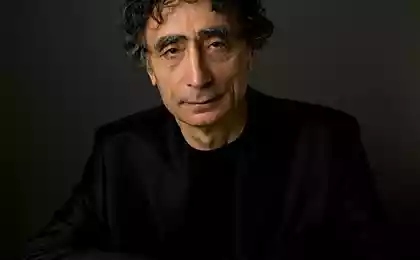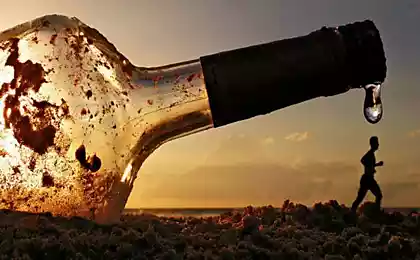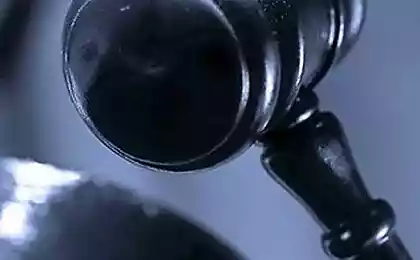1381
Why people become drug addicts: the real reason, and it's not what you think
Johann Hari, author of the bestseller "Chasing The Scream: The First And Last Days of the War on Drugs", on the fingers explains what is addiction, and why everyone, from governments to our parents lie to us on this subject.

100 years have passed since then, as America's first introduced bans on the sale and use of certain chemicals. And it was a long life of grueling war on drugs, which was waged against lovers of unusual sensations of our teachers and the government.
Some myths about drugs is so deeply entrenched in our minds that we take them as indisputable facts. Because everything seems so obvious.
For his new book, which I'm trying to understand the causes of addiction, I obeshhal 50 thousand kilometers around the world. It took me three and a half years. During its exciting journey, I realized that everything I was told in school and on TV about drugs is a lie.
I'm ready to tell you a different story. Of course, if you are willing to listen.
If we truly want in our society were not drug addicts, we have to start something more than just a war on cops with drug dealers. We have to change ourselves.
Over the past three and a half years, I have met a lot of unusual people. Billie holiday — one of the active participants of the government's war against drug dealers. Jewish doctor of the Budapest ghetto, who tried drugs for the first time in childhood. Shemale from Brookline, who was conceived when his mother-addict father raped, a police officer in new York. The man who became the first victim of the dictatorship of Uruguay and then — President, who decided that the best way to overcome drug addiction is to legalize it.
I had a personal reason to find answers to these questions. One of my earliest childhood memories: one of my relatives was so high that he could not even stand up.
In General, I am a significant part of his life trying to understand what causes people to become dependent on certain substances, and why they can't stop.
When I became a young man, one of my close relatives had become a cocaine fiend. So I had to build a relationship with a drug addict. Probably why I'm so unconcerned about these issues. And do not intend to retell well-known cliches.
If I asked my girlfriend, that is the reason why people begin to take drugs then she would have looked at you like an idiot? Is it not clear that carries them? It's not that hard to understand if someone became an addict in your eyes.
Imagine that you, I and dadati people every day walk past the kiosk, near which someone actively offers us a real pill of joy. What is the probability that you would have never caught on a hook, if you knew 100% that in order to get hooked on this chemical, you need to take it at least 20 times? I think it is zero. First, you just like the buzz, and then comes the most conventional 21st time, after which you are already experiencing a fierce craving for the substance. That's what addiction means. Everything is logical, isn't it? Not true.
In the 80s America held a legendary experiment with rats. Its essence is very simple. The rat was placed in a cage with two water bottles — the usual and a bottle to which was added heroin or cocaine. How many times you have repeated this experiment, a rat will almost certainly choose the "drug" of water — and this will continue until, until it kills itself.
This is usually explain: "In one of the bottles was so powerful substance that nine out of ten laboratory rats will instantly become dependent on him. And then tormented himself so active that he was dying. Similarly, the cocaine effect on people."
But in the 1970s, a psychology Professor from Vancouver Bruce Alexander conducted the same experiment, but it seemed to him very strange. The rat was placed in a cage all alone. It has nothing to do with how people usually take drugs.
Alexander built a rat Park with multiple cells, plates of food, colored balls, tunnels and lots of animals. Since different water bottles drink was different (as in the original experiment), during the experiment the water mixed with drugs at least once I tried all the rats.
But you know what? Rats who lived an exciting and fulfilling life (so much fun!) in this Ret Park does not sit down nor on cocaine, no heroin. For several days the experiment they have figured out which bottles have drugs and what not. And drank water from a "fun" cans only in every fourth case. No not the rat became a drug addict and brought himself to death.
So the assumptions of Alexander was correct: if a living being placed in a supportive environment, it is unlikely to become dependent on one type of drug.
The analogue of this experiment, but on the people, was held around the same time — during the Vietnam war. Time magazine writes that "the soldiers in that time used heroin instead of gum".
According to the Archives of General psychiatry in the United States, every fifth veteran of the Vietnam war suffered from heroin addiction until the end of life. When the war ended, back home in the United States had returned thousands of addicts. 95% of the drug-addicted soldiers were never able to recover: a quiet family life was unbearable for them.
Now Professor Alexander argues that all the stereotypes about drug addicts, imposed by society, have nothing to do with reality. Addiction seems immoral habit that only appears to those who is too cheeky and hedonistic lifestyle. Everyone thinks that drug addiction is a consequences of the "stolen" at the chemical level of the brain. If caught on the hook, you have to not care what was going to happen next.
Alexander continued his experiments. Following his study he broke into two phases. First, he placed rats in a single cell for 57 days — and waited until they addicted to the drug. Then put first isolated in rats "society" in its Ret Park. As a result, "drug addicts" back to normal, "Good" cage saved them. The process of adaptation took in animals only a few days.
When I first learned about these experiments, I was quite puzzled. How can this be? These experiments seem too radical to believe. But the more scientists I interviewed, the more often found that if not to take into account this new approach to research, all our fuss for the study of drug devoid of any meaning.
Here one of the experiments that you can become, without knowing it. If you ever fail to slip and fall into the hospital with a broken hip, then you probably will prick diamorphine is the medical name for heroin. In the hospital there is quite a lot of people who will receive the same drug for pain relief. The heroin you will get from the doctor — and in a much more pure form than that in which it get street junkies.
So, if your "accepted" theory is correct, then you have to become a drug addict. You tasted pure and potent substance that causes addiction. But thousands of people, who have been in the hospital diamorphine, prescribed and become healthy people and not darting through doorways in search of a dose.
About it all told me the canadian doctor Gabor Mate. He was the first doctor who insolently told me that thousands of people can spend months taking drugs in the hospital, and when they come out from the hospital, forget about them. The same drug, if you buy it on the street, will turn you into desperate addicts.
So what's the deal here? Believe it or not (I used to), but drug addiction is not a chemical hook. And again we return to the experiments of Bruce Alexander: people's Commissar of the street is rat in a single cage. She has only one source of solace to which she could apply. Patients of medical clinics is "rats" of Ret Park: they return home to the people who love them. The drug is the same, but the external environment is different.
These facts give us a deeper understanding of why people become addicted. Professor Peter Cohen argues that human beings have a deep need for intimacy and relationships with other members of society. This is something from which we get the greatest satisfaction. If we can't communicate with each other, so we'll find something else- the whirr of a roulette wheel or the prick of a syringe of heroin. The addict commits to heroin because he couldn't associate it with anything else, concludes Cohen.
In order to beat addiction, we don't need sobriety. We need human relations.
If someone again will tell you that addiction is a consequence of chemical dependence, ask him: and what about gamblers? Nobody believes that a deck of cards can be "empty vein".
Or take the problem of Smoking. Everyone knows that cigarettes contain nicotine — the substance to which you are accustomed. When the pharmacy appeared first nicotine patches, this was the reason for optimism: finally, smokers can continue to consume nicotine but without the deadly effects of Smoking cigarettes. They will be released.
But there it was. According to statistics, only 17.7% of smokers are able to quit Smoking using nicotine patches.It's not nothing: nicotine patches save millions of lives. But this figure shows that the use of other causes, not just the notorious "chemical hooks".
All of these studies have huge implications for the hundred years war on drugs.
This is an epic war: I saw her kill people in shopping malls in Mexico and on the prosperous streets of Liverpool. And this whole war is based on the assertion that we need to physically destroy a number of chemicals, because they "capture" our brains and cause addiction.
But now I realize that this war makes no sense. Ironically, the drug war only increases the number of addicts. I was in prison "Tent city" in Arizona. There are prisoners kept in solitary confinement for weeks to punish them for drug use. I think this is the best way to ruin a person and ensure that he will be the victim of a deadly addiction. And when these people will be released and will not be able to get a job because of their criminal record, they'll become addicted.
Heroin becomes their friend because they just have no one to turn to.
There is an alternative.
And I saw her. 15 years ago, Portugal had probably the most serious drug problems in Europe. 1% of its population addicted to heroin. They tried to fight this with the help of the police, but the situation only worsened. Therefore, the authorities decided to try something new. They decided to decriminalize the use of all drugs. And the money that was formerly spent on the construction of prisons and the formation of new departments narcotics, went to the purchase of drugs for substitution therapy. And also to subsidize the construction of housing and jobs.
Giving the addict the opportunity to go for opiates in a normal clean clinic, where no one will humiliate and insult, it would almost certainly deliver him from addiction.
British journal of criminology has estimated that in those countries where the laws on decriminalization of drugs, opiate use falls to 50%. I repeat: injecting drug use is reduced in two times — and only because of one stupid law!
No need to think that Portugal was not the conservatives who are frightened by all the terrible consequences such a step the authorities. In 2000 Joao Ferreira, one of the main bosses Portuguese police at the time, went to all the shows and told of the horrors that are now easy to read in the conservative Newspapers. But when we sat with him in a Lisbon cafe last year, he admitted that he was wrong. And told me that he hoped that now the whole world will follow Portugal's example.
This story is relevant not only to drug addicts.
This applies to all of us: it's time to reinvent yourself. And realize the importance of love and good relations between people. We must create a culture of mutual respect and empathy.
Bruce Alexander says that we too paid much attention to individual methods of treatment of drug addiction. But what we really need is the social rehabilitation of the drug culture. We must say that do not have the right to dissociate itself from the drug.
Our love can save them.
P. S. And remember, only by changing their consumption — together we change the world! ©
Source: lifter.com.ua/Pochemu-lyudi-stanovyatsya-narkomanami-Vot-nastoyashchaya-prichina-i-eto-ne-to-o-chem-vi-dumaete

100 years have passed since then, as America's first introduced bans on the sale and use of certain chemicals. And it was a long life of grueling war on drugs, which was waged against lovers of unusual sensations of our teachers and the government.
Some myths about drugs is so deeply entrenched in our minds that we take them as indisputable facts. Because everything seems so obvious.
For his new book, which I'm trying to understand the causes of addiction, I obeshhal 50 thousand kilometers around the world. It took me three and a half years. During its exciting journey, I realized that everything I was told in school and on TV about drugs is a lie.
I'm ready to tell you a different story. Of course, if you are willing to listen.
If we truly want in our society were not drug addicts, we have to start something more than just a war on cops with drug dealers. We have to change ourselves.
Over the past three and a half years, I have met a lot of unusual people. Billie holiday — one of the active participants of the government's war against drug dealers. Jewish doctor of the Budapest ghetto, who tried drugs for the first time in childhood. Shemale from Brookline, who was conceived when his mother-addict father raped, a police officer in new York. The man who became the first victim of the dictatorship of Uruguay and then — President, who decided that the best way to overcome drug addiction is to legalize it.
I had a personal reason to find answers to these questions. One of my earliest childhood memories: one of my relatives was so high that he could not even stand up.
In General, I am a significant part of his life trying to understand what causes people to become dependent on certain substances, and why they can't stop.
When I became a young man, one of my close relatives had become a cocaine fiend. So I had to build a relationship with a drug addict. Probably why I'm so unconcerned about these issues. And do not intend to retell well-known cliches.
If I asked my girlfriend, that is the reason why people begin to take drugs then she would have looked at you like an idiot? Is it not clear that carries them? It's not that hard to understand if someone became an addict in your eyes.
Imagine that you, I and dadati people every day walk past the kiosk, near which someone actively offers us a real pill of joy. What is the probability that you would have never caught on a hook, if you knew 100% that in order to get hooked on this chemical, you need to take it at least 20 times? I think it is zero. First, you just like the buzz, and then comes the most conventional 21st time, after which you are already experiencing a fierce craving for the substance. That's what addiction means. Everything is logical, isn't it? Not true.
In the 80s America held a legendary experiment with rats. Its essence is very simple. The rat was placed in a cage with two water bottles — the usual and a bottle to which was added heroin or cocaine. How many times you have repeated this experiment, a rat will almost certainly choose the "drug" of water — and this will continue until, until it kills itself.
This is usually explain: "In one of the bottles was so powerful substance that nine out of ten laboratory rats will instantly become dependent on him. And then tormented himself so active that he was dying. Similarly, the cocaine effect on people."
But in the 1970s, a psychology Professor from Vancouver Bruce Alexander conducted the same experiment, but it seemed to him very strange. The rat was placed in a cage all alone. It has nothing to do with how people usually take drugs.
Alexander built a rat Park with multiple cells, plates of food, colored balls, tunnels and lots of animals. Since different water bottles drink was different (as in the original experiment), during the experiment the water mixed with drugs at least once I tried all the rats.
But you know what? Rats who lived an exciting and fulfilling life (so much fun!) in this Ret Park does not sit down nor on cocaine, no heroin. For several days the experiment they have figured out which bottles have drugs and what not. And drank water from a "fun" cans only in every fourth case. No not the rat became a drug addict and brought himself to death.
So the assumptions of Alexander was correct: if a living being placed in a supportive environment, it is unlikely to become dependent on one type of drug.
The analogue of this experiment, but on the people, was held around the same time — during the Vietnam war. Time magazine writes that "the soldiers in that time used heroin instead of gum".
According to the Archives of General psychiatry in the United States, every fifth veteran of the Vietnam war suffered from heroin addiction until the end of life. When the war ended, back home in the United States had returned thousands of addicts. 95% of the drug-addicted soldiers were never able to recover: a quiet family life was unbearable for them.
Now Professor Alexander argues that all the stereotypes about drug addicts, imposed by society, have nothing to do with reality. Addiction seems immoral habit that only appears to those who is too cheeky and hedonistic lifestyle. Everyone thinks that drug addiction is a consequences of the "stolen" at the chemical level of the brain. If caught on the hook, you have to not care what was going to happen next.
Alexander continued his experiments. Following his study he broke into two phases. First, he placed rats in a single cell for 57 days — and waited until they addicted to the drug. Then put first isolated in rats "society" in its Ret Park. As a result, "drug addicts" back to normal, "Good" cage saved them. The process of adaptation took in animals only a few days.
When I first learned about these experiments, I was quite puzzled. How can this be? These experiments seem too radical to believe. But the more scientists I interviewed, the more often found that if not to take into account this new approach to research, all our fuss for the study of drug devoid of any meaning.
Here one of the experiments that you can become, without knowing it. If you ever fail to slip and fall into the hospital with a broken hip, then you probably will prick diamorphine is the medical name for heroin. In the hospital there is quite a lot of people who will receive the same drug for pain relief. The heroin you will get from the doctor — and in a much more pure form than that in which it get street junkies.
So, if your "accepted" theory is correct, then you have to become a drug addict. You tasted pure and potent substance that causes addiction. But thousands of people, who have been in the hospital diamorphine, prescribed and become healthy people and not darting through doorways in search of a dose.
About it all told me the canadian doctor Gabor Mate. He was the first doctor who insolently told me that thousands of people can spend months taking drugs in the hospital, and when they come out from the hospital, forget about them. The same drug, if you buy it on the street, will turn you into desperate addicts.
So what's the deal here? Believe it or not (I used to), but drug addiction is not a chemical hook. And again we return to the experiments of Bruce Alexander: people's Commissar of the street is rat in a single cage. She has only one source of solace to which she could apply. Patients of medical clinics is "rats" of Ret Park: they return home to the people who love them. The drug is the same, but the external environment is different.
These facts give us a deeper understanding of why people become addicted. Professor Peter Cohen argues that human beings have a deep need for intimacy and relationships with other members of society. This is something from which we get the greatest satisfaction. If we can't communicate with each other, so we'll find something else- the whirr of a roulette wheel or the prick of a syringe of heroin. The addict commits to heroin because he couldn't associate it with anything else, concludes Cohen.
In order to beat addiction, we don't need sobriety. We need human relations.
If someone again will tell you that addiction is a consequence of chemical dependence, ask him: and what about gamblers? Nobody believes that a deck of cards can be "empty vein".
Or take the problem of Smoking. Everyone knows that cigarettes contain nicotine — the substance to which you are accustomed. When the pharmacy appeared first nicotine patches, this was the reason for optimism: finally, smokers can continue to consume nicotine but without the deadly effects of Smoking cigarettes. They will be released.
But there it was. According to statistics, only 17.7% of smokers are able to quit Smoking using nicotine patches.It's not nothing: nicotine patches save millions of lives. But this figure shows that the use of other causes, not just the notorious "chemical hooks".
All of these studies have huge implications for the hundred years war on drugs.
This is an epic war: I saw her kill people in shopping malls in Mexico and on the prosperous streets of Liverpool. And this whole war is based on the assertion that we need to physically destroy a number of chemicals, because they "capture" our brains and cause addiction.
But now I realize that this war makes no sense. Ironically, the drug war only increases the number of addicts. I was in prison "Tent city" in Arizona. There are prisoners kept in solitary confinement for weeks to punish them for drug use. I think this is the best way to ruin a person and ensure that he will be the victim of a deadly addiction. And when these people will be released and will not be able to get a job because of their criminal record, they'll become addicted.
Heroin becomes their friend because they just have no one to turn to.
There is an alternative.
And I saw her. 15 years ago, Portugal had probably the most serious drug problems in Europe. 1% of its population addicted to heroin. They tried to fight this with the help of the police, but the situation only worsened. Therefore, the authorities decided to try something new. They decided to decriminalize the use of all drugs. And the money that was formerly spent on the construction of prisons and the formation of new departments narcotics, went to the purchase of drugs for substitution therapy. And also to subsidize the construction of housing and jobs.
Giving the addict the opportunity to go for opiates in a normal clean clinic, where no one will humiliate and insult, it would almost certainly deliver him from addiction.
British journal of criminology has estimated that in those countries where the laws on decriminalization of drugs, opiate use falls to 50%. I repeat: injecting drug use is reduced in two times — and only because of one stupid law!
No need to think that Portugal was not the conservatives who are frightened by all the terrible consequences such a step the authorities. In 2000 Joao Ferreira, one of the main bosses Portuguese police at the time, went to all the shows and told of the horrors that are now easy to read in the conservative Newspapers. But when we sat with him in a Lisbon cafe last year, he admitted that he was wrong. And told me that he hoped that now the whole world will follow Portugal's example.
This story is relevant not only to drug addicts.
This applies to all of us: it's time to reinvent yourself. And realize the importance of love and good relations between people. We must create a culture of mutual respect and empathy.
Bruce Alexander says that we too paid much attention to individual methods of treatment of drug addiction. But what we really need is the social rehabilitation of the drug culture. We must say that do not have the right to dissociate itself from the drug.
Our love can save them.
P. S. And remember, only by changing their consumption — together we change the world! ©
Source: lifter.com.ua/Pochemu-lyudi-stanovyatsya-narkomanami-Vot-nastoyashchaya-prichina-i-eto-ne-to-o-chem-vi-dumaete























